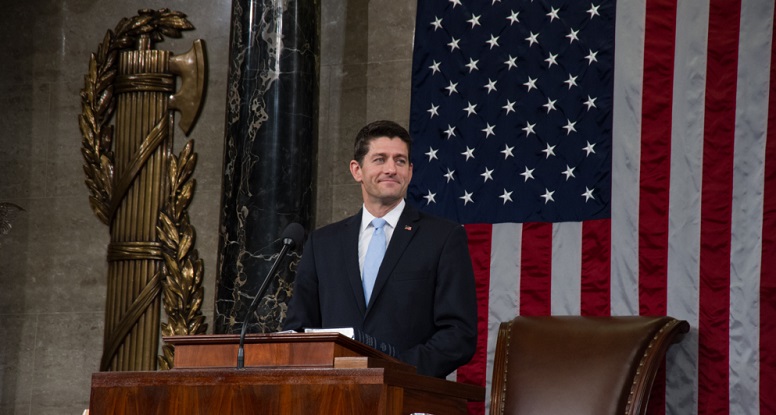Paul Ryan hasn’t been Speaker of the House for a full week yet, but he’s already facing a major test: the long-term surface transportation bill. As negotiations got underway today, Speaker Ryan said he will be easing the way for amendments and “opening up the process.”
It’s good to hear that Speaker Ryan is keeping an open mind, but will he be open to raising the federal gas tax? The Hill reported back in June that Ryan has ruled out a gas tax increase:
“I want to make very clear: I’m against raising the gas tax,” he said. “There’s not much happening in this economy to help it grow, but lower gas prices is one of them. Working families have been struggling for years to get by […] And now they’re finally catching a break. It would be downright unfair to take that away from them. So we are not raising gas taxes — plain and simple.”
The 18.4-cent federal gas tax hasn’t been increased in over 20 years, and its purchasing power has been diminished thanks to inflation and the fact that today’s vehicles are more fuel efficient. The failure of our elected leaders to increase the gas tax is leading the Highway Trust Fund down a road to insolvency — a road that is littered with potholes.
Speaker Ryan’s opposition to raising the gas tax conveniently ignores the fact that poorly-maintained roads cost drivers a lot of money — $109 billion a year, which comes out to an average of $516 per motorist. That $516 works out to be a lot more than drivers would pay if a proposal to increase the gas tax by 10, 12 or even 15 cents per gallon were passed. Former treasury secretary Larry Summers wrote last month in the Washington Post:
If we were able to raise the gas tax by 40 cents and repair our highways and roads, we would create no new net burden on consumers: The benefit in reduced vehicle operating costs would at the very least offset their higher gas bills […] And as is fair, those who drive the most would both pay the most and benefit the most from reduced repair costs.
Increasing the federal gas tax spreads the burden to anyone who purchases fuel in the United States. Costs for extra vehicle repairs aren’t spread so evenly. In New Jersey, drivers pay over $600 for vehicle repairs caused by poor roads. It’s even higher in Speaker Ryan’s home state of Wisconsin: $685 in the Madison metro area and $753 in the Milwaukee metro. And in San Francisco and Los Angeles, drivers pay over $1,000 each year on repairs caused by poor roads.
The choice is clear: raise the gas tax and improve the transportation system for everybody, or don’t raise the gas tax and provide a stimulus for auto repair shops.


[…] today: Broken Sidewalk reports that Louisville is getting its first bike lane with green paint. Mobilizing the Region says that if House Speaker Paul Ryan won’t raise the gas tax, he’s burdening drivers […]
[…] Tax: Despite House Speaker Paul Ryan’s promise to have a more open legislative process, discussion on sustainable revenue sources were squashed: a vote was allowed to cut the gas […]
[…] Paris Climate Agreement alongside 174 other nations. But collapsing gas prices–coupled with a stagnant federal gas tax–aren’t going to do much to convince Americans to dump the pump any time […]